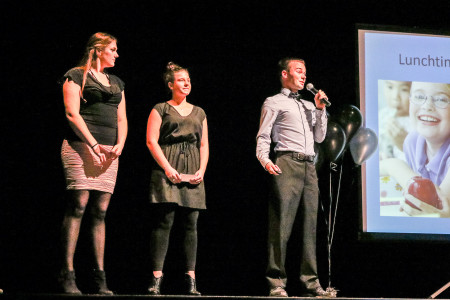
Louise Carhart, Copy Editor
carhartl17@grinnell.edu
The final round of the Spark Tank Innovation Challenge, a Grinnell College initiative to encourage beneficial interaction between the community and the College, took place this Wednesday, Oct. 28, in Roberts Theater. The format for this project was modeled on the show “Shark Tank,” with teams presenting to a panel of judges onstage.
The challenge represents an effort by the College to involve more students in the Grinnell Community while also enacting meaningful change. Each team selected a problem from a list and was required to address this issue through a comprehensive solution. The process for reaching a sustainable answer included meetings with an obstacle coach and local school officials.
“The Spark Tank Innovation Challenge offers local educators (teachers, paraeducators, principals, and so on) the chance to identify challenges they see in our educational system. They will select an obstacle to student learning or school success that they would like to see addressed in Grinnell,” wrote Lisa Lacher, Director of Media Relations for the College, in an email to The S&B.
The idea of using issues brought up by local education personnel is integral to the outcomes and goals of Spark Tank.
“Something that was very important to us was that we knew we wanted to have students work to create innovative solutions to obstacles that occur in education in our community, but we didn’t want our students to be the ones identifying the obstacles,” wrote Ashley Schaefer, the Lawrence S. Pidgeon Director of Careers in Education Professions in an email to The S&B.
The aspect of solving a problem truly important to the Grinnell education system was what drew Lucia Tonachel ’18 to the challenge.
“These are issues that have been identified by community members and they have said we want college students to help us come up with solutions. I think it’s a really unique opportunity in that way,” Tonachel said.
Tonachel worked on a project with teammate Naomi Worob ’18 that will bring a Student Resource Center to the Grinnell-Newburg Community High School. The Center will provide basic essentials to students in need, such as hygiene products and food.
For other participants, this challenge was a way to engage in the community in a positive way.
“There’s a lot of people here that are interested in community service and the social justice aspect, so I think it’s really cool that we’re not just in a bubble of the college, we consider the outside and give back, too,” said Julia Anderson ’19.
Anderson’s project, along with teammates Aditi Munshi ’19 and Shamiram Yousef ’19, would bring a community garden focused on interactive learning to Fairview Elementary School.
The goal of the challenge was to ensure that local teachers gain a voice and feel included in the decision making process.
“We wanted this to be a team effort and I think that has been one of the greatest successes of this program … one of the saddest things about education in our country is that teachers are very rarely consulted about what they believe their students need more of to be successful,” Schaefer wrote.
The Spark Tank Challenge hopes to provide some agency to these teachers while also connecting them with the innovative ideas produced by students. The teachers posing the questions functioned as “obstacle coaches” during the preparation for Wednesday night.
Besides benefiting the community, participants have also seen the positive effect the College can have in a mutually beneficial way.
“Educating yourself about certain issues and realizing how much of an impact it actually does have, and how important education is [has been a part of this process],” said Christian Clark ’18. Clark, along with team member Simone Downs ’17 has proposed an afterschool learning program to increase literacy at Bailey Park Elementary School.
Judges looked for innovativeness, feasibility, an understanding of the community and its needs as well as passion and energy from each team. Two of the four judges were retired local teachers who provided insight into the specific nuances of the community. The other two judges were this year’s Grinnell Prize Recipients, Deborah Ahenkorah and Maria Vertkin.
In the end, funding went to Tonachel and Worob’s Student Resource Center; Lunchtime Language Learners, a project focused on increasing language programs at Davis Elementary led by Christine Hood, John Gallagher and Liz Nelson, all ’17, and Tiger Allies, a program providing peer mentors to at-risk students at Grinnell-Newburg Community High School, headed by Jill Wielgos ’16.



















































